20135327郭皓——信息安全系统设计基础第十二周学习总结
|
学习计时:共6小时 读书: 代码: 作业: 博客: |
|
一、学习目标 |
掌握进程控制 掌握信号处理的方法 掌握管道和fifo进行进程间通信的方法 |
|
二、学习资源 |
|
编译、运行、阅读、理解process.tar.gz压缩包中的代码 |
实验代码
代码说明均在代码里面
exec1
1 #include <stdio.h> 2 #include <unistd.h> 3 4 int main() 5 { 6 /* 7 执行ls -l命令 8 */ 9 char *arglist[3]; 10 11 arglist[0] = "ls"; 12 arglist[1] = "-l"; 13 arglist[2] = 0 ;//NULL 14 printf("* * * About to exec ls -l\n"); 15 execvp( "ls" , arglist );//进程控制函数,根据文件名找到对饮的可执行函数,并用它来取代调用进程的内容 16 printf("* * * ls is done. bye"); 17 18 return 0; 19 }
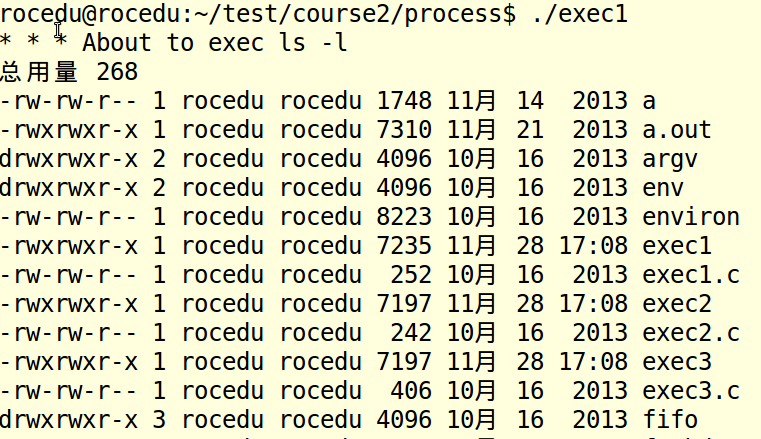
exec2
1 #include <stdio.h> 2 #include <unistd.h> 3 4 /* 5 和exec1一样,只是execvp第一个参数被替换成数组的首元素 6 */ 7 int main() 8 { 9 char *arglist[3]; 10 11 arglist[0] = "ls"; 12 arglist[1] = "-l"; 13 arglist[2] = 0 ; 14 printf("* * * About to exec ls -l\n"); 15 execvp( arglist[0] , arglist ); 16 printf("* * * ls is done. bye\n"); 17 }
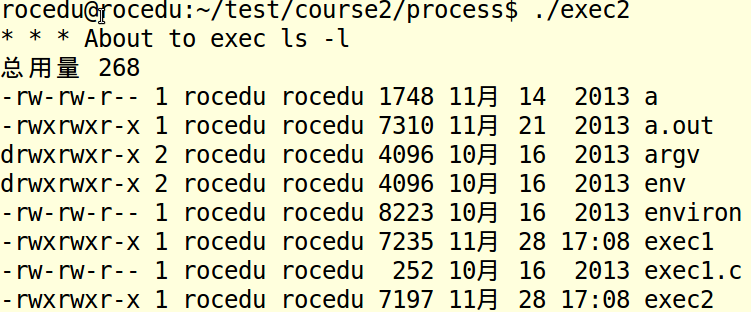
exec3
1 #include <stdio.h> 2 #include <unistd.h> 3 4 int main() 5 { 6 /* 7 和exce1一样 8 */ 9 char *arglist[3]; 10 char *myenv[3]; 11 myenv[0] = "PATH=:/bin:"; 12 myenv[1] = NULL; 13 14 arglist[0] = "ls"; 15 arglist[1] = "-l"; 16 arglist[2] = 0 ; 17 printf("* * * About to exec ls -l\n"); 18 // execv( "/bin/ls" , arglist ); 19 // execvp( "ls" , arglist ); 20 // execvpe("ls" , arglist, myenv); 21 /* 22 从PATH 环境变量所指的目录中查找符合参数file的文件名,找到后便执行该文件. 23 然后将第二个以后的参数当做该文件的argv[0]、argv[1],最后一个参数必须用空指针(NULL)作结束。 24 */ 25 execlp("ls", "ls", "-l", NULL); 26 printf("* * * ls is done. bye\n"); 27 }
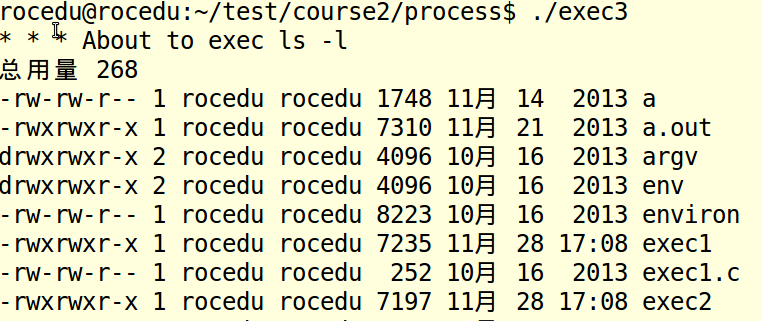
forkdemo1
1 #include <stdio.h> 2 #include <sys/types.h> 3 #include <unistd.h> 4 int main() 5 { 6 /* 7 fork()会产生一个和父进程一样的子进程 8 父进程的fork()返回子进程的ID 9 子进程的fork()返回0 10 */ 11 int ret_from_fork, mypid; 12 mypid = getpid(); 13 printf("Before: my pid is %d\n", mypid); 14 ret_from_fork = fork(); 15 sleep(1); 16 printf("After: my pid is %d, fork() said %d\n", 17 getpid(), ret_from_fork); 18 19 return 0; 20 }

forkdemo2
1 #include <stdio.h> 2 #include <unistd.h> 3 4 int main() 5 { 6 /* 7 这里创建了两个fork(),故有一个父进程 三个子进程 8 子进程只能打印第二个printf 9 */ 10 printf("before:my pid is %d\n", getpid() ); 11 fork(); 12 fork(); 13 printf("aftre:my pid is %d\n", getpid() ); 14 15 return 0; 16 }

forkdemo3
1 #include <stdio.h> 2 #include <stdlib.h> 3 #include <unistd.h> 4 5 int main() 6 { 7 /* 8 打印父进程和子进程的ID 9 */ 10 int fork_rv; 11 12 printf("Before: my pid is %d\n", getpid()); 13 14 fork_rv = fork(); /* create new process */ 15 16 if ( fork_rv == -1 ) /* check for error */ 17 perror("fork"); 18 else if ( fork_rv == 0 ){ 19 printf("I am the child. my pid=%d\n", getpid()); 20 21 exit(0); 22 } 23 else{ 24 printf("I am the parent. my child is %d\n", fork_rv); 25 exit(0); 26 } 27 28 return 0; 29 }

forkdemo4
1 #include <stdio.h> 2 #include <stdlib.h> 3 #include <unistd.h> 4 5 int main() 6 { 7 /* 8 通过getppid查看父进程ID 9 */ 10 int fork_rv; 11 12 printf("Before: my pid is %d\n", getpid()); 13 14 fork_rv = fork(); /* create new process */ 15 16 if ( fork_rv == -1 ) /* check for error */ 17 perror("fork"); 18 19 else if ( fork_rv == 0 ){ 20 printf("I am the child. my pid=%d\n", getpid()); 21 printf("parent pid= %d, my pid=%d\n", getppid(), getpid()); 22 exit(0); 23 } 24 25 else{ 26 printf("I am the parent. my child is %d\n", fork_rv); 27 sleep(10); 28 exit(0); 29 } 30 31 return 0; 32 }

forkgdb
1 #include <stdio.h> 2 #include <stdlib.h> 3 #include <unistd.h> 4 5 int gi=0; 6 /* 7 由于sleep的存在,父进程在si会停1秒。而子进程会开始,在li之后又会停止,父进程继续运行,如此循环 8 */ 9 int main() 10 { 11 int li=0; 12 static int si=0; 13 int i=0; 14 15 pid_t pid = fork(); 16 if(pid == -1){ 17 exit(-1); 18 } 19 else if(pid == 0){ 20 for(i=0; i<5; i++){ 21 printf("child li:%d\n", li++); 22 sleep(1); 23 printf("child gi:%d\n", gi++); 24 printf("child si:%d\n", si++); 25 } 26 exit(0); 27 28 } 29 else{ 30 for(i=0; i<5; i++){ 31 printf("parent li:%d\n", li++); 32 printf("parent gi:%d\n", gi++); 33 sleep(1); 34 printf("parent si:%d\n", si++); 35 } 36 exit(0); 37 38 } 39 return 0; 40 }

psh1
1 #include <stdio.h> 2 #include <stdlib.h> 3 #include <string.h> 4 #include <unistd.h> 5 6 #define MAXARGS 20 7 #define ARGLEN 100 8 9 /* 10 调用execvp函数,通过调用数组第一位为文件,数组作为可执行函数 11 */ 12 int execute( char *arglist[] ) 13 { 14 execvp(arglist[0], arglist); 15 perror("execvp failed"); 16 exit(1); 17 } 18 19 char * makestring( char *buf ) 20 { 21 char *cp; 22 23 buf[strlen(buf)-1] = '\0'; 24 cp = malloc( strlen(buf)+1 ); 25 if ( cp == NULL ){ 26 fprintf(stderr,"no memory\n"); 27 exit(1); 28 } 29 strcpy(cp, buf); 30 return cp; 31 } 32 33 int main() 34 { 35 char *arglist[MAXARGS+1]; 36 int numargs; 37 char argbuf[ARGLEN]; 38 39 numargs = 0; 40 while ( numargs < MAXARGS ) 41 { 42 printf("Arg[%d]? ", numargs); 43 if ( fgets(argbuf, ARGLEN, stdin) && *argbuf != '\n' ) 44 arglist[numargs++] = makestring(argbuf); 45 else 46 { 47 if ( numargs > 0 ){ 48 arglist[numargs]=NULL; 49 execute( arglist ); 50 numargs = 0; 51 } 52 } 53 } 54 return 0; 55 }
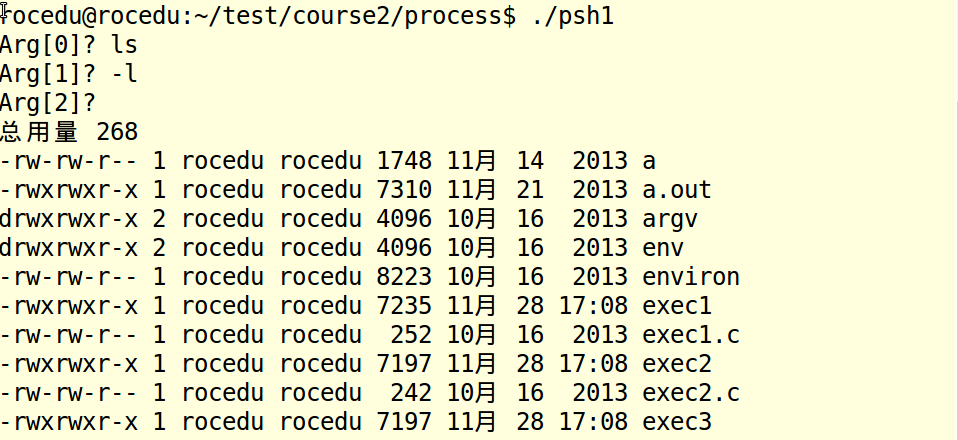
psh2
1 #include <stdio.h> 2 #include <stdlib.h> 3 #include <string.h> 4 #include <sys/types.h> 5 #include <sys/wait.h> 6 #include <unistd.h> 7 #include <signal.h> 8 9 #define MAXARGS 20 10 #define ARGLEN 100 11 12 /* 13 和psh1一样,但加入了fork()所以会不断地从头开始运行 14 */ 15 char *makestring( char *buf ) 16 { 17 char *cp; 18 19 buf[strlen(buf)-1] = '\0'; 20 cp = malloc( strlen(buf)+1 ); 21 if ( cp == NULL ){ 22 fprintf(stderr,"no memory\n"); 23 exit(1); 24 } 25 strcpy(cp, buf); 26 return cp; 27 } 28 29 void execute( char *arglist[] ) 30 { 31 int pid,exitstatus; 32 33 pid = fork(); 34 switch( pid ){ 35 case -1: 36 perror("fork failed"); 37 exit(1); 38 case 0: 39 execvp(arglist[0], arglist); 40 perror("execvp failed"); 41 exit(1); 42 default: 43 while( wait(&exitstatus) != pid ) 44 ; 45 printf("child exited with status %d,%d\n", 46 exitstatus>>8, exitstatus&0377); 47 } 48 } 49 50 int main() 51 { 52 char *arglist[MAXARGS+1]; 53 int numargs; 54 char argbuf[ARGLEN]; 55 56 numargs = 0; 57 while ( numargs < MAXARGS ) 58 { 59 printf("Arg[%d]? ", numargs); 60 if ( fgets(argbuf, ARGLEN, stdin) && *argbuf != '\n' ) 61 arglist[numargs++] = makestring(argbuf); 62 else 63 { 64 if ( numargs > 0 ){ 65 arglist[numargs]=NULL; 66 execute( arglist ); 67 numargs = 0; 68 } 69 } 70 } 71 return 0; 72 }
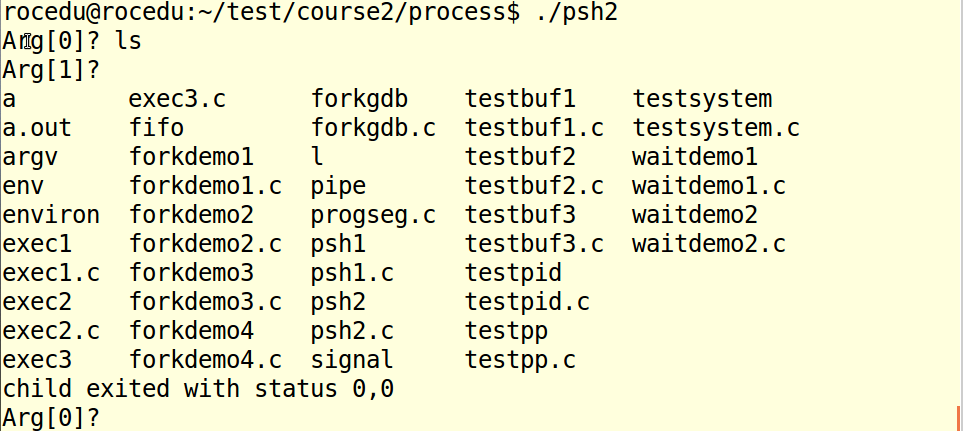
testbuf1
1 #include <stdio.h> 2 #include <stdlib.h> 3 int main() 4 { 5 printf("hello"); 6 fflush(stdout);//强制输出命令 7 while(1); 8 }

testbuf2
1 #include <stdio.h> 2 int main() 3 /*打印hello*/ 4 { 5 printf("hello\n"); 6 while(1); 7 }

testbuf3
1 #include <stdio.h> 2 3 int main() 4 { 5 fprintf(stdout, "1234", 5);//标准输出,将在缓冲流参数其打印到屏幕上 6 fprintf(stderr, "abcd", 4);//标准错误,将后面的参数和错误直接打印到屏幕上 7 }

testpid
1 #include <stdio.h> 2 #include <unistd.h> 3 4 #include <sys/types.h> 5 /* 6 打印父进程ID,如果没有父进程则打印当前程序进程ID 7 */ 8 int main() 9 { 10 printf("my pid: %d \n", getpid()); 11 printf("my parent's pid: %d \n", getppid()); 12 return 0; 13 }

testpp
1 #include <stdio.h> 2 #include <stdlib.h> 3 int main() 4 { 5 char **pp; 6 pp[0] = malloc(20);//malloc 向系统申请分配指定size个字节的内存空间。 7 8 return 0; 9 }

PS:并不知道为什么只找到一些资料,我觉得应该是内存访问出错或者非法内存访问
testsystem
1 #include <stdlib.h> 2 3 /* 4 发出两个命令,命令存在数组中 5 */ 6 int main ( int argc, char *argv[] ) 7 { 8 9 system(argv[1]); 10 system(argv[2]); 11 return EXIT_SUCCESS; 12 } /* ---------- end of function main ---------- */

waitdemo1
1 #include <stdio.h> 2 #include <stdlib.h> 3 #include <sys/types.h> 4 #include <sys/wait.h> 5 #include <unistd.h> 6 7 #define DELAY 4 8 /* 9 父进程执行parent_code时,因为wait函数会等待子进程运行完毕后再运行 10 */ 11 void child_code(int delay) 12 { 13 printf("child %d here. will sleep for %d seconds\n", getpid(), delay); 14 sleep(delay); 15 printf("child done. about to exit\n"); 16 exit(17); 17 } 18 19 void parent_code(int childpid) 20 { 21 int wait_rv=0; /* return value from wait() */ 22 wait_rv = wait(NULL); 23 printf("done waiting for %d. Wait returned: %d\n", 24 childpid, wait_rv); 25 } 26 int main() 27 { 28 int newpid; 29 printf("before: mypid is %d\n", getpid()); 30 if ( (newpid = fork()) == -1 ) 31 perror("fork"); 32 else if ( newpid == 0 ) 33 child_code(DELAY); 34 else 35 parent_code(newpid); 36 37 return 0; 38 }

waitdemo2
1 #include <stdio.h> 2 #include <stdlib.h> 3 #include <sys/types.h> 4 #include <sys/wait.h> 5 #include <unistd.h> 6 7 #define DELAY 10 8 /* 9 和waitdemo1一样 但多了子进程的三个状态 10 */ 11 void child_code(int delay) 12 { 13 printf("child %d here. will sleep for %d seconds\n", getpid(), delay); 14 sleep(delay); 15 printf("child done. about to exit\n"); 16 exit(27); 17 } 18 19 void parent_code(int childpid) 20 { 21 int wait_rv; 22 int child_status; 23 int high_8, low_7, bit_7; 24 25 wait_rv = wait(&child_status); 26 printf("done waiting for %d. Wait returned: %d\n", childpid, wait_rv); 27 28 high_8 = child_status >> 8; /* 1111 1111 0000 0000 */ 29 low_7 = child_status & 0x7F; /* 0000 0000 0111 1111 */ 30 bit_7 = child_status & 0x80; /* 0000 0000 1000 0000 */ 31 printf("status: exit=%d, sig=%d, core=%d\n", high_8, low_7, bit_7); 32 } 33 34 int main() 35 { 36 int newpid; 37 38 printf("before: mypid is %d\n", getpid()); 39 40 if ( (newpid = fork()) == -1 ) 41 perror("fork"); 42 else if ( newpid == 0 ) 43 child_code(DELAY); 44 else 45 parent_code(newpid); 46 }

参考资料:百度 深入理解计算机系统.pdf
总结
这18个代码让我深入理解了exec函数和fork函数,同时还有一些其他函数。单总的来说,还是在这两上有很大的学习。
对于exec函数:
在Linux中要使用exec函数族。系统调用execve()对当前进程进行替换,替换者为一个指定的程序,其参数包括文件名(filename)、参数列表(argv)以及环境变量(envp)。exec函数族当然不止一个,但它们大致相同,在 Linux中,它们分别是:execl,execlp,execle,execv,execve和execvp。一个进程一旦调用exec类函数,它本身就"死亡"了,系统把代码段替换成新的程序的代码,废弃原有的数据段和堆栈段,并为新程序分配新的数据段与堆栈段,唯一留下的,就是进程号,也就是说,对系统而言,还是同一个进程,不过已经是另一个程序了。若是想启动另一程序的执行但自己仍想继续运行的话,那就得结合fork与exec的使用。
对于fork函数:
fork函数启动一个新的进程,前面我们说过,这个进程几乎是当前进程的一个拷贝:子进程和父进程使用相同的代码段;子进程复制父进程的堆栈段和数据段。这样,父进程的所有数据都可以留给子进程,但是,子进程一旦开始运行,虽然它继承了父进程的一切数据,但实际上数据却已经分开,相互之间不再有影响了,也就是说,它们之间不再共享任何数据了。
系统如何来区分它们呢?这是由函数的返回值来决定的。对于父进程, fork函数返回了子程序的进程号,而对于子程序,fork函数则返回零。在操作系统中,我们用ps函数就可以看到不同的进程号,对父进程而言,它的进程号是由比它更低层的系统调用赋予的,而对于子进程而言,它的进程号即是fork函数对父进程的返回值。在程序设计中,父进程和子进程都要调用函数fork()下面的代码,而我们就是利用fork()函数对父子进程的不同返回值用if...else...语句来实现让父子进程完成不同的功能。
以上内容多是出自网络,但对我的帮助很大。



